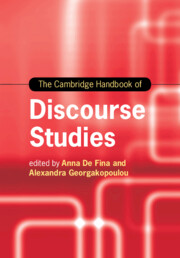Book contents
- The Cambridge Handbook of Discourse Studies
- Cambridge Handbooks in Language and Linguistics
- The Cambridge Handbook of Discourse Studies
- Copyright page
- Contents
- Figures
- Tables
- Contributors
- Preface
- Part I (Con)Textualizing Discourses
- 1 Registers, Styles, Indexicality
- 2 Situating Discourse Analysis in Ethnographic and Sociopolitical Context
- 3 Context and Its Complications
- 4 Historicity, Interdiscursivity and Intertextuality in Discourse Studies
- 5 Rethinking Narrative: Tellers, Tales and Identities in Contemporary Worlds
- Part II Perspectives and Modes of Analysis
- Part III Discourse Materialities and Embodiment
- Part IV (Trans)Locations and Intersections
- Part V Ethics, Inequality and Inclusion
- Part VI Discourses, Publics and Mediatization
- Index
- References
4 - Historicity, Interdiscursivity and Intertextuality in Discourse Studies
from Part I - (Con)Textualizing Discourses
Published online by Cambridge University Press: 28 September 2020
- The Cambridge Handbook of Discourse Studies
- Cambridge Handbooks in Language and Linguistics
- The Cambridge Handbook of Discourse Studies
- Copyright page
- Contents
- Figures
- Tables
- Contributors
- Preface
- Part I (Con)Textualizing Discourses
- 1 Registers, Styles, Indexicality
- 2 Situating Discourse Analysis in Ethnographic and Sociopolitical Context
- 3 Context and Its Complications
- 4 Historicity, Interdiscursivity and Intertextuality in Discourse Studies
- 5 Rethinking Narrative: Tellers, Tales and Identities in Contemporary Worlds
- Part II Perspectives and Modes of Analysis
- Part III Discourse Materialities and Embodiment
- Part IV (Trans)Locations and Intersections
- Part V Ethics, Inequality and Inclusion
- Part VI Discourses, Publics and Mediatization
- Index
- References
Summary
Linguistics as a modern science has invested its attention in describing structural rules and “trustworthy” parameters, which involve ideologies of objectivity, stability and invariance. These references conceived of language as an autonomous structured entity that created a kind of fixed ontology, relegating historical phenomena to a subaltern position. One can thus say that linguistics and history have been traditionally kept apart in the field of mainstream language studies. Considering the self-enclosure of linguistics, in this chapter, we begin by discussing how historicity and language are associated by different twentieth-century philosophers whose insights into historicity speak well to contemporary views of language as discourse. We then move into exploring how history is brought into textuality in present-day discourse studies by focusing on the macro–micro theoretical constructs of interdiscursivity and intertextuality. We conclude by drawing upon the relevance of such a theoretical apparatus to account for discourse circulation in fluid and superdiverse contexts. A specific question orients our line of reasoning and the pathway we construct: How can we, as discourse analysts, deal with the temporal–spatial horizon of history in view of the accelerated and ephemeral time-space references we experience nowadays? This question reflects our concern with the challenges that contemporary chronotopes pose to discourse analysis.
Keywords
- Type
- Chapter
- Information
- The Cambridge Handbook of Discourse Studies , pp. 70 - 90Publisher: Cambridge University PressPrint publication year: 2020
References
Further Reading
Focusing on Twitter communication in the context of contemporary migration crisis, this study updates the concepts of interdiscursivity and intertextuality.
This article is one of Fairclough’s earliest explorations of intertextuality and interdiscursivity.
This chapter is a comprehensive source of information on the development of Kristeva’s concept, considering both theoretical and empirical perspectives.
The purpose of this book is to explore the notions of intertextuality, dialogism and “chronotope” as tools to generate dynamic analyses in the legal context.
This article presents a discourse-historical approach and its operationalization in the context of discriminatory discourse in Austria. It singles out interdiscursivity and intertextuality as important analytical tools.
References
- 1
- Cited by

